Trans: When Ideology Meets Reality
£9.60£10.40 (-8%)
THE SUNDAY TIMES BESTSELLER and a Times, Spectator and Observer Book of the Year 2021
‘In the first decade of this century, it was unthinkable that a gender-critical book could even be published by a prominent publishing house, let alone become a bestseller.’ Louise Perry, New Statesman
‘Thank goodness for Helen Joyce.’ Christina Patterson, Sunday Times
‘Reasonable, methodical, sane, and utterly unintimidated by extremist orthodoxy, Trans is a riveting read.’ Lionel Shriver
‘A tour de force.’ Evening Standard
Biological sex is no longer accepted as a basic fact of life. It is forbidden to admit that female people sometimes need protection and privacy from male ones. In an analysis that is at once expert, sympathetic and urgent, Helen Joyce offers an antidote to the chaos and cancelling.
Read more

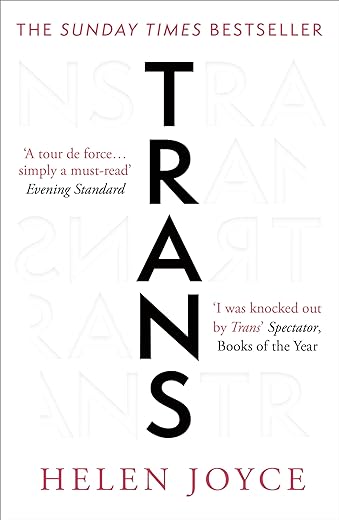
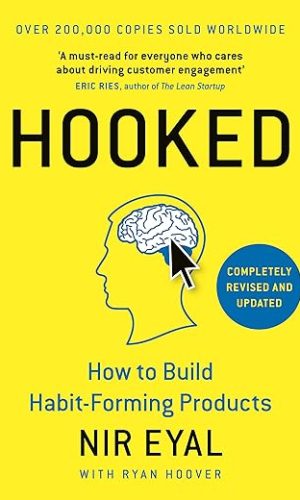

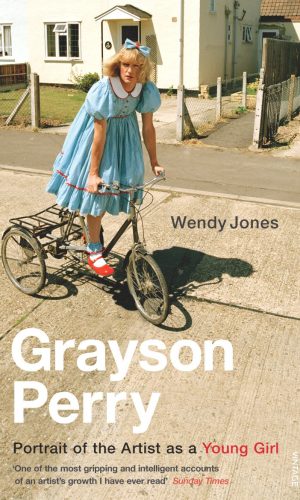
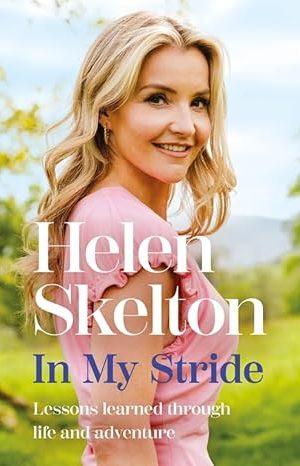

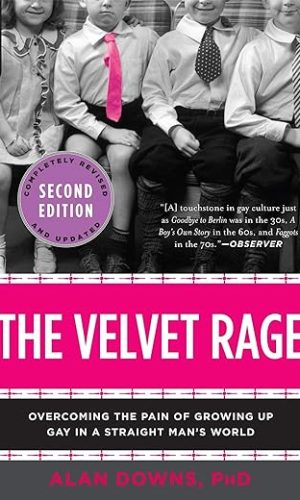
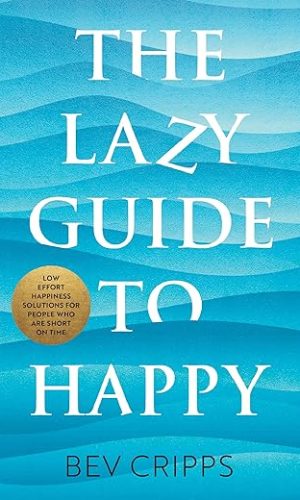
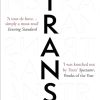
by Marc Draco
I don’t think there’s much that I can add to the reviews here other than to make some observations about the negative ones (and I’ve read them). The main thing is they account for around 4% of all the reviews if we consider the hard-edged 1*s.
This is important because that’s teasingly close to the number of people in the UK who self-identify as LGBTQ2+ if we also include those who prefer not to say.
I’ve been popularising science and technology most of my adult life and there are a couple of hard lessons we can learn from that. One, that science is very hard and two that correlation does not automatically equal causation. It is, for example, exquisitely simple to make two charts match up if they are both following an upward trend line even if the two things, for example: the number of people who like a particular TV soap vs. the number of people who get run over by electric cars. I made that one up but some searching on the Internet you’ll find both serious and humorous examples of this and it’s never clear if a research believes this or they are deliberately lying.
So we can take the figures I’ve quoted above with something of a pinch of salt, largely because of what’s called self-selection bias. That’s to say people who write reviews do so of their own accord and are not a randomised, double-blind sample. It’s simply not scientific.
My gut feeling is that there is a correlation here but that’s all it is.
However, this also exposes a fairly deep-seated failure in Amazon’s review process in that it’s possible to write a review (a long one if you have the time and skill) without ever having set eyes on the “thing” we’re reviewing. When I did this as part of my job, I wouldn’t have dreamt of such a thing and it amazes me how much we allow this to pass to this day. Even “verified purchases” only mean that the account has a record of purchasing the item – not that the person submitting the review has ever had sight or experience of said product.
Books like Trans are a particularly prone to precisely this sort of thing because the subject matter is simply polarising and there are people on both sides of the argument who hold exceptionally strong opinions that cannot be changed no matter how much evidence or well-thought argument is presented to them. Covid-19 vaccinations are a current battleground and that clearly needs no introduction with people claiming that Bill Gates (Microsoft) is implanting tracking markets to the idea that huge swathes of people are dying post-vaccination.
The Gates’ theory falls at Hitchens’ Razor (that which can be presented without evidence can be dismissed without evidence) but the post vaccination deaths are more difficult since there have been (albeit rare) cases of people who have died as a direct result of receiving a Covid-19 vaccination. While the claims, some of them coming from highly experienced and well-qualified academics, can be dismissed after a lot of work the rapidly gain traction because there is a small element of truth.
These rare cases is what brings us to transgenderism as defined as a mental illness by the DSM IV, the psychiatrist’s bible of sorts. It’s also the one area that I think Joyce’s book missed for reasons I’m unable to fathom (and I have read it cover-to-cover over the course of a weekend).
When one of my friends came out as trans decades ago, it was clear the absolute pain she (then a he) was suffering at the sight of her own body. Without going into the gruesome and rather personal detail this was a very handsome young man with a girlfriend who would have been at home on a high-end fashion shoot, suddenly facing the grim prospect that his entire existence was marred by being born into the wrong body.
You only had to listen to him talk to hear the pain in his voice and how his long-sought transition to a female body would complete him to understand why transgenderism is considered a mental illness by the current body of experts. A mental illness tends to be (simply) described as something that (a) is endemic and organic, i.e. not learned and (b) causes the patient a great deal of suffering.
My own view, based on observation and what little neuroscience I’ve been able to collect along the way, is that in “true” gender dysphoria as defined under those very specific diagnostic conditions as appear to be outlined by the DSM, is a dissonance between the mind’s internal body map and what the eyes see. Sexual preference is entirely different and while trans people might be gay, the two are not automatically linked. I suspect, and we’ve some way to go before we have canonical evidence, that this form of transgenderism is vanishingly rare, not unlike the unrelated physical conditions afflicting the runner Caster Semenya.
Like champion swimmer Michael Phelps, Semenya has physical attributes which give her a massive advantage over other natal females but the idea that she’s transgender is patently silly. Nature has given both competitors an advantage over others which raises the thorny issues of what we should do? This is not a battle that’s easily decided since both are just made that way, in much the same way as a person with gender dysphoria’s brain is made that way. But it’s strange that we had to make Semenya take hormone suppressors yet no such adjustments (think a handicap) has been made for Phelps. If that discussion doesn’t convince you that I’ve read this book, then I guess nothing will; both athletes are specifically mentioned and their advantages and treatment are easily discovered.
The root problem that Joyce attempts to navigate, not always entirely successfully, is the reasons why we’ve seen such an explosion in the number of people self-identifying as transgender.
And the crucial point here is self-identification.
There’s the infamous clap-back that goes along the lines of, “Well I could identify as a [insert absurdity here] but that won’t make it true” and yet we know in psychiatry that there are people who, through organic failures that we still don’t fully understand, form delusions that are completely real to them. One I’ve suffered from myself is the terrifying idea that I was dead… if that sounds crazy, imagining trying to figure it out while living it, but also let me assure you that while rare, it’s also very real. It’s a delusion caused by a complex error in the brain because our and because our brain is the only locus of reference we have, getting past it is harder than one might think.
But then there are learned effects and this is one of Joyce’s key points. We know that effects like placebo and nocebo exist and that they are conditions that are entirely triggered by information that’s presented to us. The patient with blinding headaches might get better if given a sugar pill but told it’s a powerful painkiller; the patient who believes that WiFi is making them sick shows symptoms when they are told the WiFi is turned on.
Joyce claims, and there is mounting evidence to support this, that many trans-self-identifiers are simply mixed up gay kids. Not all of them of course, we are too numerous to find a one-size-fits-all diagnosis for this, but far more than are actually suffering an organic dysphoria. We only have to correlated (and there’s that thing again) the rise of social media and the Internet generally, with the rise of people claiming to be trans. This has been unfortunately aided across much of the developed West, by people who are so politically hard left that any reference to facts is lost. Over on the extreme political right, the counter argument rages but (and this is a different topic) their own rhetoric has only aided pushing more children – and they are children – down the rabbit hole.
Joyce espouses a return to common sense. Partly because she clearly cares about this subject deeply and partly because she’s done the reading so many of the negative reviewers accuse her of not doing. It’s ironic because if these people, who believe they are exposing an injustice, actually read the book they would know the extensive list of references she provides to back up her arguments.
The problem is that if we don’t get a grip of this soon, we’re consigning several generations of young people to life-altering surgeries which will leave them sterile (at best) and may even kill them, just for the sake of an ideology that is growing from the validation and unchecked enabling from groups on the Internet.
And that does no one any favours.
by Nazarene
Let me start by saying this book has several flaws. Though references are made to sources, this is far from a scientific journal, so there are plenty of incidences of anecdotal evidence that just has nowhere to match up to. Even then as many people have been keen to point out, they find the sources of the book questionable regardless.
However, in my opinion, the strength of the book does not come from this aspect. Joyce has created (as far as she was able to) a compilation of points that many people have concerns over, but so far little has been answered for many people regarding mainstream media. Although she does not entirely manage to do this neutrally (occasionally reverting to using her language in a way that is inflammatory), I feel like she has at least made a serious attempt at trying to make the book as readable for as many people as possible.
To me this was extremely valuable. Having met many trans people and now recently had a friend who is in the process of transitioning, I realised I really had no idea what the movement was about. There have been the occasional vague posts online about it and when you google it you often find a blanket ‘just be supportive’. This has just simply not been enough for me to be able to sit comfortably with it, especially since unfortunately in my experience the people I have met who were openly in the process of transitioning were extremely troubled individuals. It is very hard to ask the kind of questions I wanted to ask when I knew they were suffering, and I really didn’t want to make their problems worse.
However, down to the flaws of this book, and the fact it was obviously biased, this has finally allowed me to start a dialogue with a friend of mine who has recently come out as non-binary about the other side of the story.
I will address mine and their points in regards to some of the main issues in this book:
Joyce wants to ask ‘why’, as in, why would somebody become transgender? I can understand why she wants to ask, however her concerns have narrowed her down to basically only considering someone as transgender if they make the step to transition their body. This is not exactly the case, it seems to be a minority of an already small group of people that feel as strongly as to try to take those steps (even if the number of referrals for this kind of transition is increasing quite steeply). Many are happy to simply to refer to themselves as non-binary or their chosen gender and call it a day. I don’t think it’s inherently wrong to ask why someone would end up wanting to make such permanent changes to their body when currently our methods of changing the body are very far from perfect. In the future you might be able to change at will and no one would ever know, but unfortunately that is very far from the case right now. To me the question of ‘why’ goes only so far as to protect vulnerable people. If someone is suffering from a horrific trauma which has then led to them blaming their body for the trauma occurring, I feel like we ought to know this and address this before any sort of transitioning starts. Similarly, if the person is just internalising extreme homophobia about themselves and hating themselves for that reason vs any others, there should be mental health interventions to help them accept themselves and their sexuality before they make permanent changes. But personally I draw the line when genetic factors start getting involved in these sorts of things, I’m not sure that society is really ready to know about what genetic factors lead to someone’s self. There is also the argument that at the end of the day, so long as a person is an adult, they’re really allowed to make any sort of body modifications they wish, and that’s the law as it stands.
Joyce frequently makes mention of the fact that the male sex are involved in more violent crimes and therefore there are many more of them in prisons. My friend’s point is that really, how on earth was someone who had crimes specifically against the female sex and children then allowed to transfer into a prison made for them in the first place? Similarly, there are female-sex child abusers out there and they should also not be anywhere near children either. My friend argues this and Joyce’s point regarding safeguarding of children in places such as Guides are more to do with failures in prison systems and vetting of potential employees. These cases are meant to be reviewed on a case-by-case basis, so that people who have previous criminal records and so on should just never be working with/have access to children in the first place. And in terms of prisons, well many of them are managed by G4S in the UK, and you don’t have to Google that for long to see how bad their track record is. Basically, this safeguarding issue is a lot less to do with Transgender people specifically and more to do with systematic failures of prison management and hiring employees who will be working with vulnerable people. I can’t help but agree with my friend’s point in this case. Joyce seems to think that parents should be able to know that Transgender people are working with children in single sex environments such as Guides, but I don’t really see what is relevant regarding this short of someone having religious reasons regarding it all. So long the employee has no previous criminal records and are appropriately trained, how are they any more of a danger to children than anyone else is?
In terms of Joyce’s arguments about teenagers of mixed-sex sharing spaces that were previously only ‘single-sex’. Personally, I’m of the opinion you can’t stop teenagers being teenagers, so really we should be focusing on safe sex practices vs abstinence. Obviously not everyone agrees on that point. Which is why this overall needs a much more open discussion about what everyone can agree on and be comfortable with. It may be that we have to build buildings with multiple designated spaces, but obviously at some point you have to draw a line for financial restrictions, even though I guess ideally we would just have spaces for everyone who needed them and had safeguarding concerns.
When it comes to children being able to receive drugs that allow them to slow down puberty before becoming legally old enough to then take hormones, for me Joyce’s concerns are still valid only so much as there is no data proving if then going through puberty with cross hormone supplements really does much long-term damage or not. Unfortunately, in this scenario, we will probably only find out once people have been allowed to do so. Interestingly, whereas Joyce paints this situation to be mostly about genetalia, my friend said a majority of trans people she had known were going for the hormones to stop things (or develop things) like Adam’s apples and voice changes. Which implies to me in my very limited knowledge that hopefully any damage to reproductive organs is actually quite minimal. So long as you never progress to any sort of surgery afterwards, which not everyone does.
Joyce also mentions the factor of social media and, really more specifically, the fact that young children are vulnerable to manipulation. This issue however is also present from their own parents, who Joyce mentioned have caused whistle-blowers at Tavistock to question if patients were transgender or their patient’s parents were just so ridiculously homophobic that was the only way for their children to make peace with them about their sexuality. There are no easy answers here. However, I believe mental health, not just for transgender people, but for literally all of us, is severely overlooked. Nearly all of us would do well by having a course of CBT therapy at regular intervals, especially teenagers. There are also specific therapies for PTSD or trauma related events, like Rewind Therapy, which are now very quick and can really make a major difference to someone’s life, and I hope one day to see these widely covered by the NHS. Knowing that the mental health for a struggling teen would be addressed at a base level (I.e. their opinion of themselves as a person) would hopefully put these kind of concerns to bed. It may also flag up child abuse a lot quicker than we otherwise do. This would hopefully mean that there are no underlying issues that are causing a child to be pressured into making that sort of decision, and it really is just the very issue that they do not feel comfortable in their body.
My friend and Joyce both mention the horrific nature of the internet, whereby people send out death threats to people on both sides of this argument, even going so far as to doxx people and so on and so forth. This has caused a complete breakdown in communication for so many people, so that the trans movement (to me anyway) has basically been unheard of. Because although it is quite prevalent to hear about trans people on the internet, you just don’t really hear about it much outside of that. To me this is a major disservice to everyone, not just transgender people. It would be wonderful if we could have more public transgender people speaking on these issues and being ambassadors, it would really help alleviate some of this weird taboo that people have about talking about the whole situation. I have been told by my friend that people are terrified because of such death threats on the internet. I believe the people who send those kinds of threats are in the minority, and obviously rarely act out on these threats because otherwise pretty much all of us who ever used the internet would be dead by now. Social media can be very useful, but it has brought out an extremely toxic side of humanity that we still haven’t really found a way of solving, so frankly these discussions need to come out of the internet and into real life.
The topic about three people secretly funding the transgender movement was, frankly, laughable. This was a memorable time that Joyce probably let her own fears get on top of her and started ‘reaching’.
There is only one point that I personally right now cannot make peace with regarding (some of) the Transgender movement, that sex and gender are the same thing. For this I will have to continue to do my own research, as I do not feel right now I have enough knowledge to say either way with certainty. This includes me looking into the debate about female and male sex athletes, who one commenter here dismissed quite unfairly as ‘most girls past age 10 do not deeply desire to play football (any kind)’. To that reviewer, I would point out this isn’t about ‘most girls’, this is about the few who do desire to play sports and make their very careers dependant on being good at it.
Since many one-star commenters repeatedly said that this book was ‘poorly researched’, but then refused to provide any useful sources relating to counter arguments (something I was sorely looking for), for anyone reading this who is interested, my next read will be ‘Whipping Girl’ by Julia Serano. I’m not sure it’s the best resource currently for a counterargument, but my hope is someone will directly respond to Joyce’s points in time.